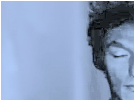Issue 04 of Surreal Poetics marks the end of a long hiatus. Today, 11 June 2020, marks the four year anniversary of the first issue of Surreal Poetics. That first issue started out with a simple vision: to provide a space for people to achieve surreal freedom through poetry. The reader should not equate our use of the word surreal with its pedestrian use to mean weird or strange. Surreal Poetics is for the surrealist and founded on the tenets of Surrealism.
The vision for what Surreal Poetics could be evolved over the course of the second and third issues to include art and poems in multiple languages. We are grateful to all of the poets and artists whose contributions to Surreal Poetics and dedication to the surrealist cause have made our endeavor successful. The fourth issue will return to a simpler format that focuses solely on the poem and seeks to observe the world through the surrealist’s penetrating gaze.
The vision for what Surreal Poetics could be evolved over the course of the second and third issues to include art and poems in multiple languages. We are grateful to all of the poets and artists whose contributions to Surreal Poetics and dedication to the surrealist cause have made our endeavor successful. The fourth issue will return to a simpler format that focuses solely on the poem and seeks to observe the world through the surrealist’s penetrating gaze.
ƚԋҽ ρҽɳҽƚɾαƚιɳɠ ɠαȥҽ
THE EYE
allows us to see what lies outside of us, but it is also viewed as a window into our soul. The eye is an organ that reveals and deceives; as a symbol it suggests wisdom and knowledge, yet it can cast negative energy through its stare or inflict harm as the evil eye.
What mysteries of life, the universe, nature, microscopic germs, and so on has your gaze penetrated? What secrets has the eye revealed?
The Comte de Lautréamont accessed the heavens with his ρҽɳҽƚɾαƚιɳɠ ɠαȥҽ:
One day, then, tired of trudging along the steep track of earthly voyage and of staggering like a drunkard through life’s dark catacombs, I slowly raised my morose eyes (ringed with huge bluish circles) toward the concave firmament, and, though so young, dared penetrate the mysteries of heaven! Not finding what I sought I raised my dismayed gaze higher, still higher, until I caught a sight of a throne fashioned of human excrement and gold upon which, with idiotic pride, body swathed in a shroud made of unwashed hospital sheets, sat he who calls himself the Creator!¹
André Breton calls us to be seers in Surrealist Situation of the Object:
In the mental domain no more than in the physical, it is quite clear that there can be no question of “spontaneous generation.” The creations of the Surrealist painters that seem to be most free can naturally come into being only through their return to “visual residues” stemming from perception of the outside world. . . .
Thus the whole technical effort of Surrealism, from its very beginning up to the present day, has consisted in multiplying the ways to penetrate the deepest layers of the mental. “I say that we must be seers, make ourselves seers”: for us it has only been a question of discovering the means to apply this watchword of Rimbaud’s.²
Thus the whole technical effort of Surrealism, from its very beginning up to the present day, has consisted in multiplying the ways to penetrate the deepest layers of the mental. “I say that we must be seers, make ourselves seers”: for us it has only been a question of discovering the means to apply this watchword of Rimbaud’s.²
For Issue 04: The Penetrating Gaze
We are interested in how and what the eye reveals to those who are endowed with supersensible vision—to see what is within and without, to see through and beyond—to see and experience, with all of the senses, that which is hidden from common perception.
Daren Berton, Editor
Surreal Poetics
Daren Berton, Editor
Surreal Poetics
Notes:
[1] From the Second Canto. Comte de Lautréamont, Maldoror and the Complete Works, 3rd ed., translated by Alexis Lykiard, Cambridge: Exact Change, 2011, p.76.
[2] André Breton, “Surrealist Situation of the Object,” in Manifestoes of Surrealism, translated by Richard Seaver and Helen R. Lane, Ann Arbor: U of Michigan Press, 2010 Ann Arbor Paperbacks edition, 255-278, p.273.
[1] From the Second Canto. Comte de Lautréamont, Maldoror and the Complete Works, 3rd ed., translated by Alexis Lykiard, Cambridge: Exact Change, 2011, p.76.
[2] André Breton, “Surrealist Situation of the Object,” in Manifestoes of Surrealism, translated by Richard Seaver and Helen R. Lane, Ann Arbor: U of Michigan Press, 2010 Ann Arbor Paperbacks edition, 255-278, p.273.

 RSS Feed
RSS Feed
